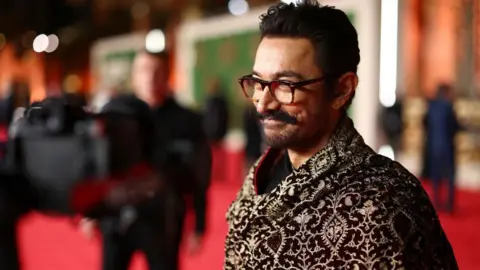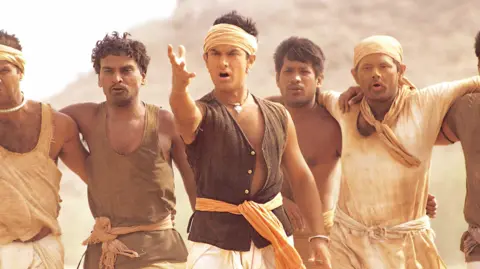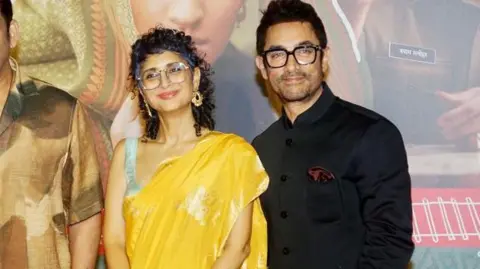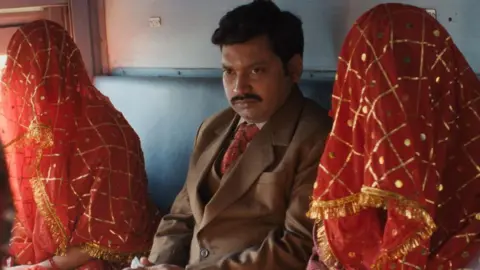Bollywood superstar, Aamir Khan is known for some of India’s most popular films, including Lagaan and 3 Idiots.
So great is his appeal, that he can barely walk down the street without getting mobbed by fans.
What’s less well-known is that he secretly quit films during the COVID-19 pandemic in order to spend more time with his loved ones.
“I told my family I’m done with acting and films,” he tells BBC News.
“I [didn’t] want to produce or direct or act. I just wanted to be with the family.”
You’d imagine a major star like Khan deciding to quit the industry would have sent shockwaves through India, a nation that is fully obsessed with films.
But, he explains, his decision went unnoticed at the time because so few movies were being made due to the pandemic.
“No-one knew about it,” he says.

Fans can breathe a sigh of relief, though.
Khan didn’t quit for long. And now he’s back and is promoting Laapataa Ladies – or Lost Ladies – a film he’s produced. It is India’s official pick for the Oscars in the best international feature film category.
Khan says it was his children who convinced him to go back to work.
“They were like, ‘But we can’t spend 24 hours with you. So get real and get a life.’ So they gently nudged me back into the films,” he says.
At 59, Khan has worked as an actor, director and producer for three decades.
He’s known as one of the three “Khans of Bollywood” – the others being fellow megastars Shah Rukh and Salman.
Known for tackling social issues, Aamir’s films are widely acclaimed as well as breaking box office records.
He is also no stranger to the Oscars. Lagaan, a film about cricket set in the 19th Century during the British Empire, was nominated for best foreign language film in 2002.
Khan is now trying to make history with Laapataa Ladies. If it succeeds, it would be the first Indian film to win the coveted international prize. He will find out whether it has made the shortlist on Tuesday.
Khan said he’s “not quite sure how seriously” to take awards. “Cinema is so subjective,” he says.
But he admits a win would mean a lot to India.

“I think Indians are so film crazy and we’ve been dying to win the Academy Award for an Indian film, which hasn’t happened till now. So the country will go ballistic. They’ll just go mad if we win,” he says.
“So just for the people of our country and for our country, I would be really happy if we win the award.”
Set in rural India, Laapataa Ladies tells the story of a young man bringing the wrong bride home. Meanwhile, his wife ends up lost, having to fend for herself.
It’s a satire looking at the treatment of women, including touching on the sensitive topic of domestic violence.
Khan describes the plot as “a bit Shakespearean”, with its focus on humour and mistaken identities.
But, he adds, it’s saying “a lot of important things about women’s issues, their independence, their right to decide for themselves what they want to do”.
It was these issues that drew him to the film in the first place, he explains.
“Every now and then you get an opportunity as a creative person to actually also sensitise people about certain issues that we face in society,” he says.
“Women all over the world have been subjected to a lot of challenges in their lives. Women have a raw deal in life. So I felt that here is a story which really brings that out well in such a nice way, which is why I wanted to produce it.”

Khan was also “very keen” that his ex-wife, Kiran Rao, should direct the film.
The pair, who married in 2005, announced their separation in 2021. But they have remained close, both professionally and personally.
“I think the reason I chose Kiran was because I knew that she would be very honest with it and that’s what I wanted,” he says.
“We get along really well. We really love each other, we respect each other.
“Our relationship may have changed slightly – but that doesn’t mean what we feel for each other has gone down or something.”
That’s not to say it’s all been plain sailing, however.
Khan admits there were arguments on set.
“We can’t make a film without an argument. So we argue every point and we have strong opinions,” he says.
“But our sensibilities are very similar. We are not talking about fundamental things. We are just trying to sometimes convince the other person a better way of conveying something.”
Bollywood on the global stage

Bollywood produces hundreds of films every year and has a huge following among Indians globally.
The sway the films and stars have on their fans’ imagination cannot be overstated.
It has had recent success at the Academy Awards, with Naatu Naatu from RRR winning the best original song and The Elephant Whisperers awarded the best documentary short film.
But victory in the international film category has so far eluded it, something Khan attributes to the competition.
“India has made really great films over the years. Occasionally it’s a matter of the right film not getting sent or the best film not getting sent,” he says.
“But otherwise we have to understand that the films you’re competing against – you’re not competing against five or six films, you’re competing against almost 80 or 90 films, which are the best in the world.”
As to whether a Bollywood film could one day scoop the best overall film award, Khan says it is “possible”.
But Indian film-makers would first need to start making movies for a global market, he adds.
“I’ve never really looked at an international audience,” he says. “We have such a large audience of our own that it doesn’t come in to our mind.
“That will only happen when Indians start making films for a world audience. I don’t think we have the bandwidth for it right now.”
‘I don’t work after 6 o’clock’
For now, Khan is focusing on a range of projects alongside Laapataa Ladies, which also include his next film Sitaare Zameen Par, due for release in 2025.
Looking further out, he’s hoping to make one film a year, while his “dream project” is to take on Mahabharat – the ancient Indian epic.
But since unretiring from the film, he is determined to do things differently. Again, this was influenced by his children.
“My son said, ‘You’re an extreme person’,” he says.
“He said, ‘You’re like a pendulum. You only did films, films, films. And now you want to swing to the other side and do no films and be with family, family, family. There is a middle place also you can think about.”
Khan says his son told him to “try and bring some balance” into his life.
“And I thought he was right. So since then, that’s what I’ve been trying to do – living a balanced life where I’m working really hard, in fact, I’m doing much more work than I ever did, but I don’t work after 6 o’clock any more.”
Khan says he has also started therapy in recent years, inspired by his daughter Ira, who works in mental health.
“I think that’s something that’s really helped me. That’s really helped me understand myself better.
“I’m actually finding that balance between work and personal life. So I feel that I’ve reached that space now.”

